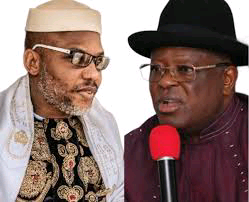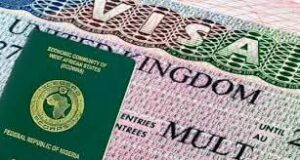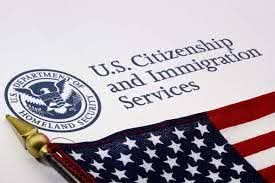How I championed Freedom of Information Bill as a lawmaker – Jerry Ugokwe

Ambassador Jerry Sunny Ugokwe, former federal lawmaker from Anambra State who championed the Freedom of Information Bill spoke to Chuks Okocha on World Press Freedom Day. Excerpts:
How did the idea of the Freedom of Information Bill start in the first place?
As a graduate student and later a government staff in the United States of America, I followed closely the evolution of the Freedom of Information Act of the United States of America. In the process I became so interested that I promised myself that whenever Nigeria frees herself from the shackles of military dictatorship and returns to democracy that I will champion a Freedom of Information Bill if God favoured me to be elected to the National Assembly.
So, what happened when you became a member of the House of Representatives?
Late 1998 and early 1999 Nigeria began the process of democratization.
When in 1999 Nigeria’s return to democracy was declared and election dates were announced I was quick to return home to Nigeria to contest for a seat to represent Idemili North and South Federal Constituency in the House of Representatives. I contested for the nomination under the Peoples Democratic Party (PDP) and was duly nominated. God answered my prayer and I had an overwhelming victory at the polls to become a member of the House of Representatives.
As soon as I made up my mind to return home to Nigeria I took time to draft the Freedom of Information Bill. My victory gave meaning to my desire and aspiration to be one of the foot soldiers in the fight for press freedom in Nigeria and one way I believed the war could be won was through a Freedom of Information Law that will grant everyone unfettered access to information.
A few days after my swearing-in as a member of the National Assembly in June, 1999, I presented the then Speaker of the House of Representatives, with a draft bill for an Act of National Assembly to make it easy for Nigerians to have access to information, otherwise known as Freedom of Information (FOI) Bill. Several sessions were organized between the legal department and myself as the Assembly was new and many people were still learning the ropes. The legal department in my several discussions with them confessed that the draft bill that I presented was as detailed, organized and complete and that it required that no amendment to bring it to conformity. The draft was then printed and gazetted accordingly. In other words, the Freedom of Information Bill was the first private member bill presented in the House of Representative in 1999.
What were the challenges?
It was a long hard road to convince my colleagues to buy into it and support it on the floor of the House. It was highly misunderstood and shot down many times on the floor of the Assembly. This was no surprise to me as Nigeria was newly getting out of the shackles of dictatorship and all the attendant symptoms were visible. My colleagues in the National Assembly both Senate and House of Representatives opposed the bill openly. I received calls from many “big men” outside the National Assembly questioning my motive for sponsoring such, in their own words, “a controversial bill.” Many feared that it would cause government to pry into their private lives, while others believed that it was not necessary at that time in the stage of our democratic development where many had been tented with colours of military corruption and not yet willing to shed the toga. It was a tedious effort and hard work to bring many of my colleagues on the same page. However, at the very long last, after rigorous defending and long hours of meetings and public hearings the bill was finally passed by the House of Representatives toward the end of the session of the 4th Assembly. The bill was transmitted to the Senate for concurrence but the Senate did not get to consider it before the 4th Session of the National Assembly ended. The end of the 4th Session of the National Assembly without concurrence by the Senate meant the end of the road for the FOI Bill.
When it was not signed into law, what happened?
On my re-election into the 5th Session of the National Assembly and the House of Representatives in 2003 I re-initiated and re-introduced the Freedom of Information Bill. With the gruelling and unpleasant experience I gathered in the 4th Session of the National Assembly, it was easier to convince my colleagues to support the Bill. In 2005, the Freedom of Information Bill again was passed by the House of Representatives. Drawing from my past experiences it was easy to form a coalition of the media, other agencies and Non Governmental Organizations to put pressure on the Members of the Senate for concurrence. Finally in 2006 the Senate concurred to the Bill Passed by the House of Representative and the Freedom of Information Bill was transmitted to the President for assent for the last huddle.
Everyone waited patiently for Mr. President’s assent to the Bill but it was not forthcoming. We began to ask questions and even began to brace up for an override. As events unfolded it was obvious something was amiss. Probing further, the Presidency “claimed” that the Bill was never transmitted to Mr. President. It sounded like a joke knowing that the process of transmitting Bills from the National Assembly to Mr. President was not so complicated that the Bill could get lost in transit. Incidentally year 2007 crept in and electioneering process reached a crescendo and no one could spare the time for Freedom of Information Bill anymore. Soon after the 5th Assembly of the National Assembly and the Federal Executive Council were dissolved, without a Freedom of Information Act in place.
In 2007 the 6th Session of the National Assembly was convened. I did not return to the Assembly but was appointed to serve as Nigeria’s Ambassador to Austria with Concurrent Accreditation to Slovakia. At the resumption of the 6th and with my absence in the National Assembly, Hon. Abike Dabiri-Erewa, who encouraged me as a journalist while working with the NTA and partnered with me when she was elected to the House of Representatives in 2003 took up the challenge and dusted up the Bill and re-introduced it in the House of Representatives as required by the rules. With the support of those members who had followed the journey of the Bill so far joined hands to pull the Bill through the House of Representatives. Subsequently the Senate again concurred and President Goodluck Jonathan willingly assented to the Bill soon after it was transmitted to him. A Freedom of Information Act was finally born and my dream was realized at last! Thus the long walk for Freedom came full circle.
In some quarters many agencies and parties have jumped on the bandwagon to propagate the epistle of Freedom of Information Act. No one has cared to extend invitation to the originator of the Bill to seek for further and in-dept understanding of the spirit and the intent behind the conceptualization of the Act. It is convenient to forget the beginning and only celebrate the end, however, if there was no beginning, the end would never have come. I am therefore grateful to Mr. Chuks Okotcha who was a journalist covering the National Assembly at the time I was a Member and at the time of sponsoring of the great bill now an Act, for reaching out to me at this auspicious time of World Press Freedom Day to recast for posterity the genesis of the FOI Act and the challenges faced to bring it to fruition. I am immensely grateful to you for this singular action and may God bless you. It is only if and when recognitions such as this is achieved shall we truly celebrate Freedom of Information Act – A long walk to Freedom for all Nigerians!






